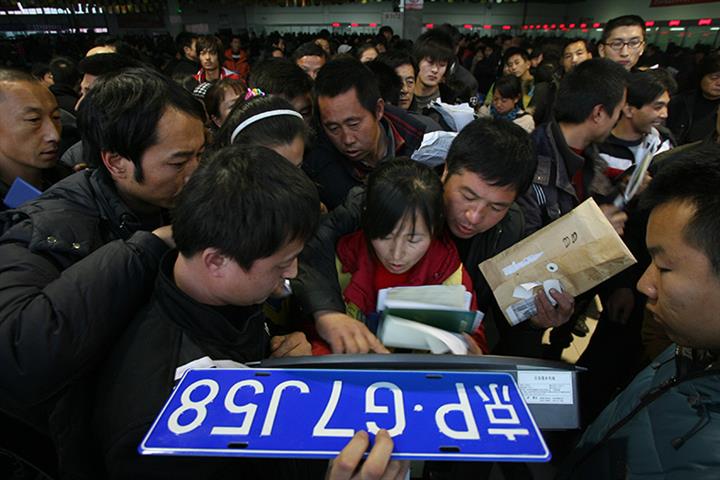 Each Beijinger to Get Only One Car Tag From 2021
Each Beijinger to Get Only One Car Tag From 2021(Yicai Global) Dec. 7 -- Beijing will implement a brand-new license plate management system from next year, per which each resident can only register one passenger car in the city to optimize resource allocation and prioritize the needs of vehicle-less families.
Those with two or more autos all registered under the same identity will henceforth have to make family members the new registrants for other cars.
Beijing ranked first among all Chinese cities with over 6 million private cars as of June, data from its Bureau of Public Security show. The Chinese capital was the third most-congested city in China during rush hour in the third quarter, following Chongqing and Guiyang, both of which have far more complex and rugged topography, per a report on urban transport Baidu Maps released last month.
Beijing’s transport commission issued the new policy on its website today and will begin to enforce it from Jan. 1. Those who already own more than one car can use their extra(s) until they are scrapped, but can renew the validity of only one of the plates when buying a new vehicle. Other tags must be transferred to the owner's eligible spouse, parents or children.
The commission has also optimized its scheme to allot the city's plates for new energy vehicles. Car-free local families will enjoy higher priority in getting 60 percent of the new NEV plates next year, and the proportion will rise to 70 percent in 2022 before further climbing to 80 percent starting from 2023.
Battling Bulge
Beijing is expected to issue 100,000 new passenger car tags next year, the same number as in 2020, per the new policy. Of these, 40,000 are for conventional fuel vehicles and 60,000 are for NEVs. The plan is still subject to the city government's approval.
The Chinese capital began to curb the burgeoning number of vehicles running on its roads by setting license plate quotas to ease the city’s notoriously snarled traffic and noxious air. Residents of the sprawling city of some 22 million inhabitants must win a license-plate lottery to buy a new internal combustion car, while those applying for NEV license registrations only have to join a very long line for theirs.
Local residents applying for quotas of gasoline fuel vehicles were at about 3.51 million and those applying for the NEV quota were at 466,453 as of October, data from Beijing's transport authority show.
These planned 40,000 plates can only meet the needs of about 1.1 percent of the existing 3.51 million applicants, while those who apply for a new NEV plate this year must wait more than seven years if the 60,000 quotas remain unchanged.
Editor: Ben Armour, Xiao Yi